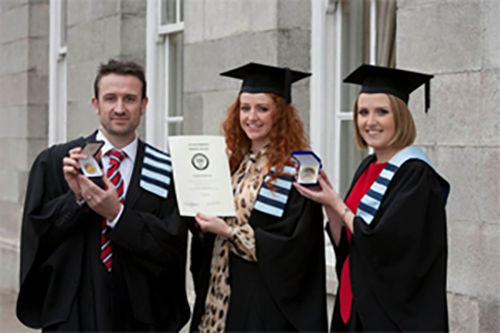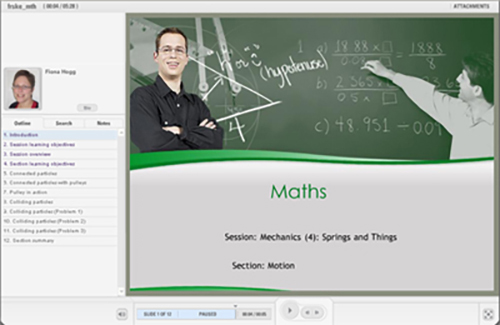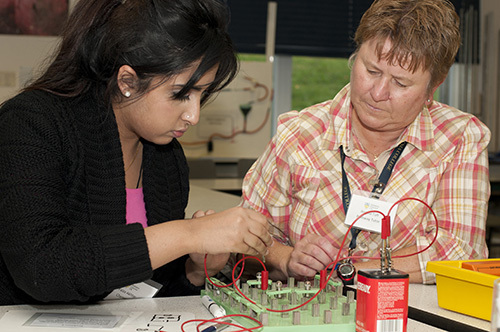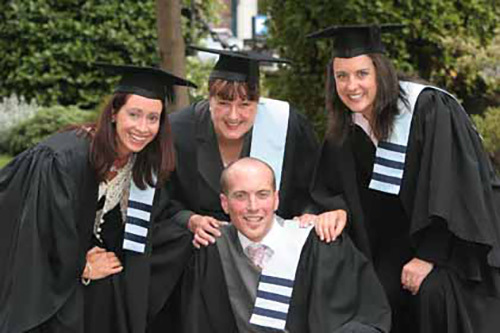
Dr. Nicholas Breakwell passou quase uma década no Hibernia College na Irlanda e em sua subsidiária no Reino Unido (este último foi recentemente adquirido pela TES Global para quem a Breakwell presta consultoria). During that time he had overall responsibility for teaching, learning strategy and e-learning infrastructure. Breakwell’s responsibilities included the development of digital learning tools that now power all Hibernia College online programs. The College is the largest provider of newly qualified teachers in Ireland. Hibernia’s groundbreaking approach to high quality ITT (initial teacher training) is setting a high bar for other e-learning organizations. What started as a highly protested transition, with fears that online teachers wouldn’t be properly trained, is becoming a global phenomenon. As schools adjust to these shifts, I talked to Breakwell about the future of e-learning and the challenges and opportunities that lie ahead. From digital badges on top e-learning platforms to live inner-ear headphone coaching for teachers, Breakwell gave me the scoop on what’s to come.

What progress has been made in providing support and resources for training teachers via the Internet that had previously been inaccessible?
Teachers can now access an overwhelming volume of resources via the internet. Hoje, the challenge is not access to content but identifying those resources which can add value in the classroom. The entire continuum of teacher education from pre initial teacher training through teacher qualification, CPD, master’s level study and even professional doctorates and PhDs can now be accessed via the internet.
High quality ITT (initial teacher training) can be delivered online, a fact which has been externally validated by the Teaching Council of Ireland and by OFSTED in England. Embora o acesso a uma escola ainda seja obviamente necessário para treinamento, today no aspiring teacher should be denied entry to the profession as a result of being unable to access an ITT provider. Schools can now “grow their own” teachers by mentoring and supporting local trainees who go on to work in the school post qualification.
But it is not just full award bearing programmes which can now be accessed online. Por exemplo, Times Education Services TES Resources offers teachers the opportunity to download community loaded lesson plans, schemes of work, assessments and other resources at the touch of a button. Mais recentemente, TES has introduced a marketplace to enable teachers to sell high quality resources to one another.

How do you see the opportunity for technology to deliver progressive learning and development for teachers and complete the challenge of professionalizing teachers?
Despite the many resources available online, most teachers’ learning and development still takes place in-school in traditional face to face settings. In England most teachers access 5 ou 6 in-service training days per annum, 70-90% of which is delivered by school colleagues. Typically these training days cover whole school topics, school policy and deciphering the latest department of education directives. Em outras palavras, there is little time available for personalised professional development leading to professional progression and improved pupil outcomes.
The impact of University led provision is hardly inspiring either – in England only around 5% of the teaching workforce is engaged in post-graduate or master’s provision despite literally hundreds of available programmes including 72 Masters of Education awards.
E, no entanto, significant personal professional development can and does take place in schools through the professional practice of planning, teaching and evaluation. What is missing, and what technology can provide, is a framework to recognise these professional achievements and skills and a system to create personalised development pathways that are practice relevant and create maximum impact in the classroom. Since time intensive, costly and often less than relevant masters programmes have failed to support the teaching profession, what is now needed is a system of micro awards which recognise and develop real improvement in practice and outcomes.
One technology that could provide this solution is Open Digital Badges (ODBs). ODBs is a Mozilla created standard for designing and issuing micro-credentials which can be displayed in the form of a digital image (badge) across any digital network. Badges could be created for achievements as small as a lesson plan through to a large-scale strategic implementations in a school. Because they are open, badges can be created and issued by anyone. Schools could create their own workforce development strategy underpinned by a badge system where each teacher sets out on a badge acquisition pathway for the benefit of themselves, but more importantly, the pupils and the wider school community. Schools can define and publish their workforce development activities in terms of badges issued and teachers can clearly identify their own achievements and publish these for all stakeholders to see.
Some early examples of badged CPD for teachers already exist. The national professional association for technology in education (NAACE) has launched three CPD badges around the new computing curriculum. In Finland a partnership between a regional education authority and two technical Universities has developed and launched 50 small social media related badges, using Open Badge Factory, for secondary school teachers.

How do you imagine the role of the teacher 5, 10, e 20 anos a partir de agora?
It takes time for technology to impact the professional practice of teachers. There remains a professional zeitgeist to challenge change until proven effective which perhaps is very valid given that a recent OECD report finds that investing heavily in school computers and classroom technology does not improve pupils’ desempenho. The OECD’s education director, Andreas Schleicher, said school technology has raised “too many false hopes”.
But technology is not going away. Schools and teachers must prepare pupils for a world of work which is dominated by technology and for jobs not yet in existence which will rely on technology. As learning technology becomes commonplace in schools, at home and in work, we will see a gradual shift in the role of the teacher from educator to coach. The teacher’s day to day role will become that of coaching pupils in how to learn as opposed to telling them what to learn.
To facilitate this transition, technology will reduce or eliminate repetitive teaching tasks (and of course admin) resulting in the flipped classroom as the norm. In-ear coaching from federation based expert coaches will roll-out best practice everywhere. Effective online interactive live teaching platforms will enable expert super-teachers to deliver classes across a school federation, addressing the shortage in qualified teachers in shortage subjects. Adaptive learning platforms will facilitate personalised student pathways enabling teachers to offer a truly differentiated learning experience for the first time. Micro recognition systems will support learning and assessment outside of the classroom for both pupils and teachers.
Based on the success of e-learning sites such as Hibernia, do you expect to see an acceleration in online education?
Sem dúvida, online education will continue to flourish for 3 motivos principais:
- The access, scale, cost and peer-community USPs of online education versus traditional face to face education are simply unassailable.
- International research supporting the effectiveness of online education has become more robust to the extent that the data now strongly support the conclusion that blended learning produces better outcomes than other modes of learning. To continue teaching without leveraging the benefits of online education will ultimately negatively impact learner outcomes.
- We have moved past the early adopter stage. When Hibernia launched blended ITT in Ireland in 2003, opposing ITT providers mobilised their students to march on the Department of Education to protest against teaching teachers online, describing online education as “yellow pack” (poor quality). Em 2015, every ITT provider in Ireland delivers at least some of its provision online.

(Todas as fotos são cortesia do Dr.. Nicholas Breakwell)
Junte-se a mim e líderes de renome mundial, incluindo Sir Michael Barber (Reino Unido), Dr. Michael Bloco (EUA), Dr. Leon Botstein (EUA), Professor Clay Christensen (EUA), Dr. Linda, Darling-Hammond (EUA), Dr. MadhavChavan (Índia), Professor Michael Fullan (Canadá), Professor Howard Gardner (EUA), Professor Andy Hargreaves (EUA), Professor Yvonne Hellman (Holanda), Professor Kristin Helstad (Noruega), Jean Hendrickson (EUA), Professor Rose Hipkins (Nova Zelândia), Professor Cornelia Hoogland (Canadá), Honrosa Jeff Johnson (Canadá), Senhora. Chantal Kaufmann (Bélgica), Dr. EijaKauppinen (Finlândia), Secretário TapioKosunen Estado (Finlândia), Professor Dominique Lafontaine (Bélgica), Professor Hugh Lauder (Reino Unido), Senhor Ken Macdonald (Reino Unido), Professor Geoff Mestres (Austrália), Professor Barry McGaw (Austrália), Shiv Nadar (Índia), Professor R. Natarajan (Índia), Dr. PAK NG (Cingapura), Dr. Denise Papa (US), Sridhar Rajagopalan (Índia), Dr. Diane Ravitch (EUA), Richard Wilson Riley (EUA), Sir Ken Robinson (Reino Unido), Professor Pasi Sahlberg (Finlândia), Professor Manabu Sato (Japão), Andreas Schleicher (PISA, OCDE), Dr. Anthony Seldon (Reino Unido), Dr. David Shaffer (EUA), Dr. Kirsten Immersive Are (Noruega), Chanceler Stephen Spahn (EUA), Yves Theze (LyceeFrancais EUA), Professor Charles Ungerleider (Canadá), Professor Tony Wagner (EUA), Sir David Watson (Reino Unido), Professor Dylan Wiliam (Reino Unido), Dr. Mark Wormald (Reino Unido), Professor Theo Wubbels (Holanda), Professor Michael Young (Reino Unido), e Professor Minxuan Zhang (China) como eles exploram as grandes questões da educação imagem que todas as nações enfrentam hoje.
A Pesquisa Global para Educação Comunitária Página
C. M. Rubin é o autor de duas séries on-line lido pelo qual ela recebeu uma 2011 Upton Sinclair prêmio, “A Pesquisa Global para a Educação” e “Como vamos Leia?” Ela também é autora de três livros mais vendidos, Incluindo The Real Alice no País das Maravilhas, é o editor de CMRubinWorld, e é um Disruptor Fundação Fellow.
Siga C. M. Rubin no Twitter: www.twitter.com/@cmrubinworld






Comentários Recentes